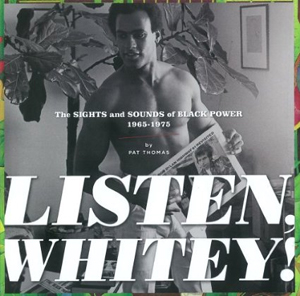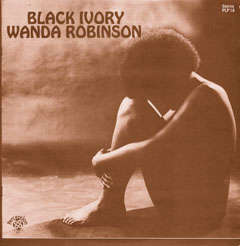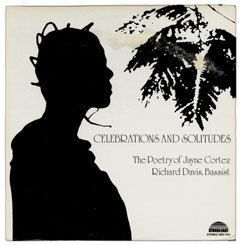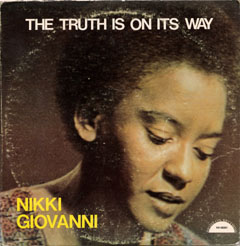"Listen, Whitey!"

Book excerpt by Pat Thomas
(June 2012)
PSF is proud to present this excerpt from the extensively researched book Listen Whitey- The Sounds of Black Power 1965-1975 by archivist extraordinaire Pat Thomas. Below you'll find the story of three poets-turned-singers (who deserve more recognition than they're usually due) as chronicled in the book.
You can buy the book at the Fantagraphics website and Amazon and the soundtrack from the Light in the Attic website.

WANDA ROBINSON: Poet Wanda Robinson's first experience as a writer was composing letters for neighborhood Baltimore girls whose boyfriends were fighting in Vietnam. She charged 25¢ to talk about love on their behalf. As the '60s progressed and Robinson entered college, her writing turned more political, although it still focused on male-and-female relationships. Inspired by singer Arthur Prysock's 1969 LP, This Is My Beloved, a collection of romantic poems by Walter Benton set to music by Mort Garson, Robinson recited her poetry into a tape recorder while playing albums in the background.
Classmates at the Community College of Baltimore were impressed, as were local DJs who played her recordings on the air. Soon, the 20-year-old received a phone call from Perception Records in New York. Perception was known for releasing jazz (Dizzy Gillespie and James Moody were among its stable of artists), while Perception's sister label Today Records focused on soul, such as the band Black Ivory. While she was in New York, they offered Robinson access to their tape library, suggesting she pick prerecorded tracks. She chose several pieces from the Harlem-based R&B group Black Ivory, hence the name of Robinson's 1971 debut, Black Ivory. Although the liner notes claim that the poems are taken from Robinson's book The Daze of Wine...Without Roses, she never got around to publishing it. Her second album for Perception, 1973's Me and a Friend, was assembled from session outtakes from Black Ivory and released without her input. By that time, Robinson had dropped out of music and was in the process of changing her persona to Laini Mataka.
While others have placed Robinson in the same league as the Last Poets, I'd file her work in the category of mediocre, freshman-year of college love poems, supplemented by extraneous background music. Given the origins of her poetry, that's exactly what it is! In 1977 she self-published Black Rhythms for Fancy Dancers under the name of Laini Mataka. In subsequent decades, she's become a respected figure of black consciousness, with works published by Baltimore's Black Classic Press (who have also reprinted George Jackson's Blood in My Eye and Bobby Seale's Seize the Time).

JAYNE CORTEZ: Jayne Cortez was pivotal in the Black Arts Movement. At the suggestion of SNCC's James Forman, she went to Mississippi in 1963 to participate in voter registration drives. Returning to Los Angeles, she founded a Friends of SNCC chapter. Wanting to focus on the artistic side of the movement, Cortez started facilitating writing and drama workshops in Watts in 1964 (the year she ended a decade-long marriage to jazz maverick Ornette Coleman). Cortez' relationship with the infamous L.A. ghetto continued to grow when she co-founded the Watts Repertory Theatre Company, where one of her understudies was Stanley Crouch from 1965 to 1967. Crouch learned to play drums so that he could accompany Cortez' poetry. Crouch, who notoriously disavows anyone connected to that era, still holds Cortez in high regard. He not only views her as the only interesting female poet of the Black Arts Movement, but he uncharacteristically praised her in a November 1995 interview with The New Yorker, in which Crouch reflected, "I'd never met anyone with that kind of aesthetic commitment, who'd drawn a line in the dirt and said, 'I am an artist.'"
In the Spring 2001 issue of African-American Review, professor Tony Bolden called Cortez "The most profound manifestation of the tradition of African-American Resistance poetry." Bolden's description of Black Arts poetry is sublime. "Black Arts poets, who were attuned to the impact of Malcolm X and James Brown on black audiences, realized that sermon and song/shout could be utilized to create a popular people's poetry…[they could] blur the distinction between poetry and song by using the voice as an instrument."
Cortez' 1969 book Pissstained Stairs and the Monkey Man's Wares helped pinpoint music's relevance to the black community. The poem "How Long Has Trane Been Gone" is a blend of the blues, jazz and the ghetto. Cortez even incorporates the state of the music business: "There was a time when KGFJ played all black music from Bird to Johnny Ace on show after show -- but what happened, I'll tell you what happened -- They divided black music, doubled the money and left us split again is what happened."
Her 1970 collection Festivals and Funerals further reflected her sociopolitical imagination, setting the stage for her 1974 album, Celebrations and Solitudes on Strata-East Records. Recorded in July 1974, the album features nineteen poems written between 1968 and 1973 that cover the unification of Africa, Malcolm X, Watts, Harlem and points in between. Celebration and Solitudes has a distinctive sound, as Cortez' only accompaniment is a double bass played by Richard Davis, who's worked with Lou Donaldson, Joe Henderson, Andrew Hill and Roland Kirk. On Celebrations and Solitudes, Davis' jazz styling interacts exquisitely with Cortez' prose. He provides a mournful bowed bass on "Remembrance," supporting Cortez' solemn poetry about the 1973 death of Amilcar Cabral, murdered by the Portuguese while attempting to free Guinea from colonial rule. His percussive plucking underlines "Lexington/96 Street Stop," while Cortez bristles in her description of a black man innocently drinking a soda on a subway platform being badgered by a "policemen with his fucking face of stink breath harassments."

NIKKI GIOVANNI: Over the past four decades, Nikki Giovanni has become famous through volumes of poetry, children's books and academic achievement. Despite her mainstream profile, she's retained some edge in her contemporary work -- in the poem "All Eyez On You," a tribute to Tupac Shakur's album All Eyez On Me.
While in college, Giovanni was a member of SNCC. Meeting H. Rap Brown in May of 1967 at the Detroit Conference of Unity and Art propelled her into the Black Arts Movement. In 1968, she published two volumes of poetry, Black Feeling, Black Talk and Black Judgment. Her third book Re: Creation followed in 1970. Her writing contained a diverse mix of angry militancy and personal reflection. Poems like "The Great Pax Whitie" challenging the injustice of racism, "And the word was death to all niggers" sat alongside celebrations of family life expressed in "Nikki Rosa": "Everybody is together and you and your sister have happy birthdays." Her audience widened when she took her poems and successfully recorded them with the gospel New York Community Choir on her 1971 debut album, Truth Is on Its Way. Her public performances increased at this point, culminating with an appearance on The Tonight Show with Johnny Carson in June 1972. A second album, Like a Ripple on a Pond, followed in 1973. Also in '73, a book of conversations between her and iconic writer James Baldwin was published.
As the decade progressed, Giovanni toned down her militant rhetoric and her writing focused more on domestic life. This shift was reflected in her third record, when producer Arif Mardin (Aretha Franklin, Roberta Flack) was brought in to oversee her 1975 The Way I Feel album. Mardin's smooth production style did, however, make for an interesting contrast when she reached back to her 1970 poem "Revolutionary Dreams" and combined it with Mardin's choir of singers and a large band. She recited:
I used to dream militant dreams of taking over America, to show these white folks how it should be done, I used to dream radical dreams, of blowing everyone away with my perceptive powers of correct analysis…then I awoke and dug that if I dreamed natural dreams of being a natural woman...I would have a revolution.